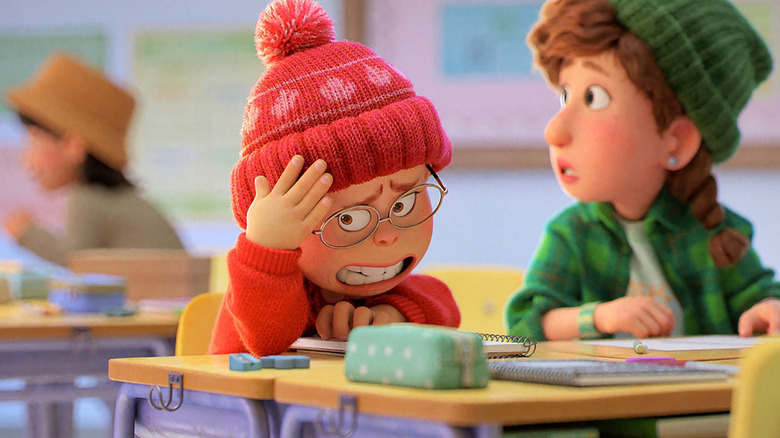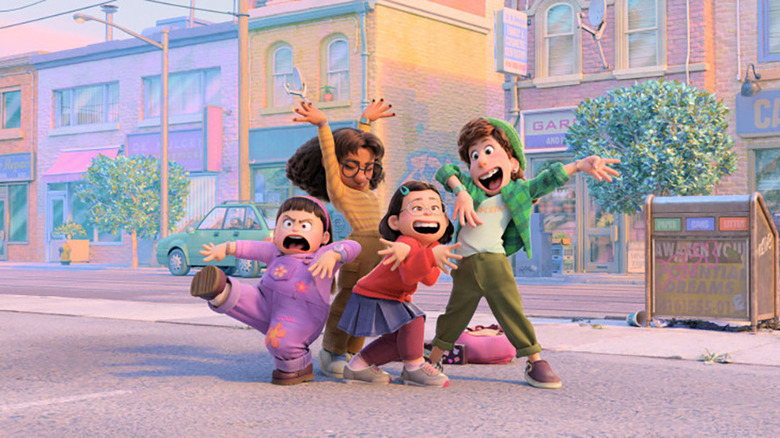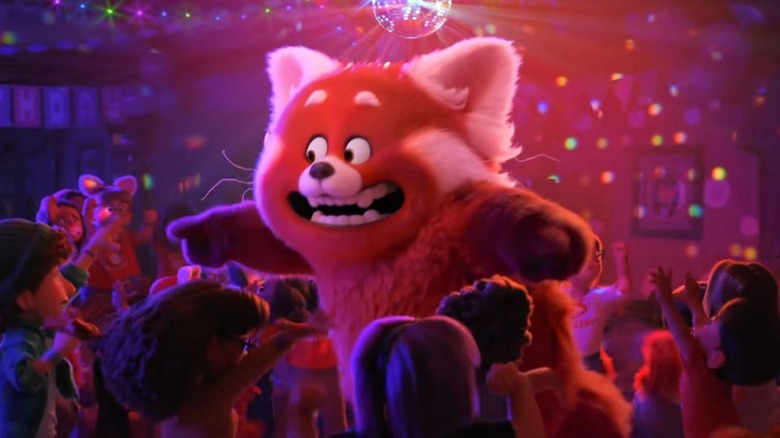How Turning Red Is Helping Audiences Learn To See Themselves In Teen Girl Characters [Exclusive]
It's been commonly accepted in the entertainment industry that girls will watch "boy's content," but boys won't watch "girls' shows." Coming-of-age movies that center on boys are considered universal classics, but coming-of-age movies about girls are pushed under the "chick flick" category. It's this backwards way of thinking that makes studios nervous to invest in stories about young women, fearful that the lack of "universal appeal" will allow their film to be profitable. After 27 years of putting out feature films, Pixar is finally giving the opportunity to tell a teen girl story, with the gigantic coming-of-age story, "Turning Red." I was fortunate enough to talk with film director Domee Shi and producer Lindsey Collins about the film, who believe that there's so much more to the film than just a story of a girl.
"I think when non-teen girls watch the movie, they're going to be surprised at how much they relate to Mei and her struggles with her mom, and her identity and trying to figure out who she needs to be," said Shi.
"Turning Red" focuses on 13-year-old Mei Lee who wakes up one day to discover that whenever her emotions get too big to handle, she transforms into a gigantic red panda. To make matters worse, when she finally shows the truth of her transformation to her family, she learns that they've known this day was coming, but they thought they'd have a little bit more time.
'I Didn't Know Girls Could Be Funny'
Puberty is a nightmarish hellscape for anyone, but it's not without its hilarious moments. "When we were showing it to people at Pixar and test audiences, the comment that we get over and over again is, 'Oh my gosh, I didn't know girls could be funny,' which is a weird thing to hear," said Shi, continuing:
"I think a lot of the humor and the heart will transcend the specificity of the movie ... I think we're going to be redefining what a universal story looks like with this movie, which I think is really cool."
Mei Lee isn't alone on her journey, navigating the wild world of teenagedom with her family, but also with her friends Miriam, Abby, and Priya. The four of them together feel like hanging out with all of your childhood best friends. Producer Lindsey Collins seconded Shi's comments, noting that the internal audiences at Pixar are as critical as the general public, so they have a good idea when a moment is working or not.
"I'm always reassured when we can show the movie to everybody at Pixar and have the type of response that we got–which is that people were laughing really hard, everybody was cringing in those moments universally, even if they were not necessarily related to the specific moment. Everybody was like, 'Oh my God, I had a moment like that in school, or with my parents' ... that tween time is one that all of us don't want to revisit to some degree."
I can confirm, there's not enough money in the world that could make me willingly revisit my 13-year-old life.
'These Moments Still Resonate Really Deeply'
Much like the way Bo Burnham's "Eighth Grade" successfully captured the universal cringe of middle school through the lens of a teenage girl, "Turning Red" is seeking to do the same but, you know, with metaphors of giant red pandas. "Even if you're really distant from it, you're my age or you're 60 or 70, somehow those moments still resonate really deeply when you see them on a screen," Collins said. "My hope is, and our hope is that it makes people feel like that commonality of that age, and remember it as viscerally as we tend to when we're watching it here."
Sure, you might not have ever been a teen girl, but I'm willing to bet you've never been a giant red panda either ... or maybe you have, I don't know your life. Regardless, learning to see yourself in stories that don't center you in a perfect one-to-one comparison is one of the easiest ways to learn how to develop empathy for others, and film is a great tool to help anyone improve their emotional competency.
"Turning Red" premieres on Disney+ on March 11, 2022.


